This Electrical Engineer and IIM Alumnus Is Now Helping Small Farmers with Her Innovations
Engineer and business graduate Devi Murthy identified growing difficulties faced by small-scale Indian farmers. With her farming equipment development company, Kamal Kisan, she began to customise her products to suit the needs of the small-time Indian farmer.
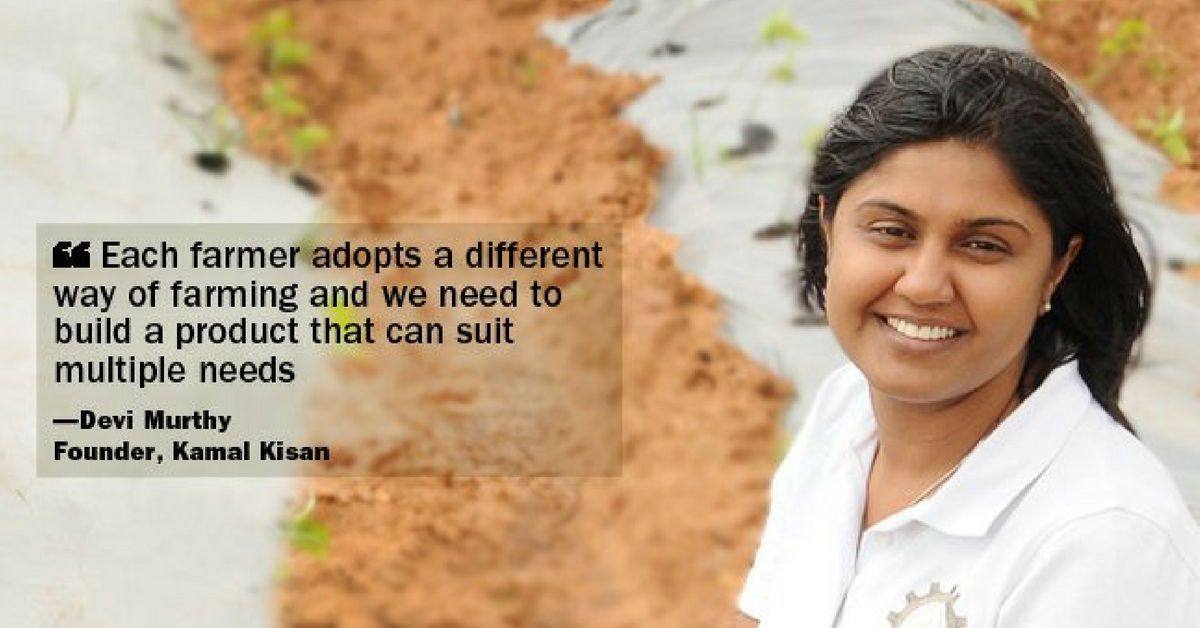
Engineer and business graduate Devi Murthy identified growing difficulties faced by small-scale Indian farmers. A majority of agrarian workers in the country were finding it increasingly difficult to keep up with rising labour costs, but were unable to mechanise their cultivation processes because imported farm equipment was unsuitable to their modest farm sizes. With her farming equipment development company, Kamal Kisan, she began to customise her products to suit the needs of the small-time Indian farmer.
In a survey done in 2014 by CSDS it was found that, given an option, 76% of farmers in India would prefer to take up alternative lines of work. Poor income, bleak future prospects and job stress were cited as the main reasons for this trend.
The survey covered a comprehensive 5,000 farm households across 18 states.
With farmers spending over 40% of their total cultivation costs on labour alone, the profession is no longer deemed profitable inciting over 100,000 farmers to give up farming every year. A lack of relevant technology and the burgeoning costs of labour– increasing by nearly double over every three-year period – set the stage for serious food security concerns by 2020.
On the other hand a PTI report, published early in January last year, states that while around 1.5 million engineering students graduate every year in India 80% of them remain unemployed.These students mostly end up working out of their areas of expertise, in roles that don’t interest them.
The founder of Kamal Kisan, Devi Murthy, saw a potential solution to both problems.
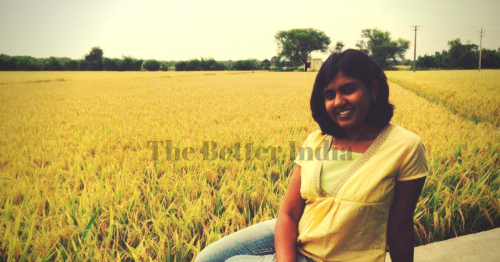
“India, as a country, is capable of a lot more innovations in agriculture but we are not doing enough in that area. Indians are known for their jugaad mechanism. We need to take this mechanism to the next level where it gets community focus and not individual focus,” she says.
It was with this belief that Devi– who holds an electrical engineering degree from Drexel University, USA and Masters in Entrepreneurship from IIM, Bangalore –began Kamal Kisan. Her aim was to kick-start a company that would develop cost-effective, smart mechanization solutions for India’s small and marginal farmers, to reduce labour dependence and increase profitability.
It was taken for granted that Devi would join the family business, an established sheet metal fabrications and components manufacturing company called Kamal Bells. Keeping with tradition, she joined the firm as Head of Product Development and Business Development and worked at the post for over six years.
However she was unable to shake off a desire to begin a project that would create social impact. The idea first occurred to her while she was pursuing her Masters in Entrepreneurship at the Indian Institute of Management (IIM) Bangalore. One of her classmates, who belonged to a farmer’s family, suggested that she use her skills to help farmers.
Devi began her journey to start Kamal Kisan by spending two years travelling across the country to meet small farmers. She also visited various institutes such as the CIAE in Bhopal and the UAS in Dharwad. Her research made her realize the large gap that existed between the needs of the Indian farmer and the expensive, large-sized, imported machinery used in farming.
Despite the fact that India is the 3rd largest tractor manufacturer in the world, less than 2% of the country’s farmers use mechanization. A dearth of equipment and scarce availability of hands-on-the-ground have driven up labour costs. Farmlands with less than five acres of area constitute more than 80% of farm holdings in the country today. The increasing non-availability of labour has become a major concern among farmers as it leads to low productivity. Furthermore, adapting modern, mechanized techniques in cultivation have proven to be difficult because most available machinery is unsuitable for small farms.
Devi decided to use her machine development skills to help small farmers.
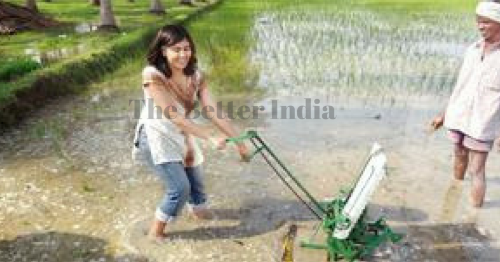
“We, as innovators, never see small farmers as our customers. I think this perspective has to be changed,” says Devi.
A hardcore city girl, Devi had never visited a farm before. But once she became focused on developing products for the sector, she began to attend farmer fairs, travel to fields across the country and survey farmers to better understand their needs and the products already available in the market.
Often, she juggled her newfound interest in farm equipment with her day job at the family firm.
“I would sneak out two hours earlier than usual from my regular job and spend time at my workshop in the same facility. I had hired two people with my salary and together we would inspect existing farm equipment from China and tinker around to see how we could make it better and suitable for the Indian farmer,” she recalls.
Finally, with a seed fund of Rs.5 lakh from the Rural Technology and Business Incubator (RTBI) at IIT Madras, Devi began her experiment in 2013. She also received incubation and mentoring from Villgro Innovation Foundation in 2014 to ensure her venture had all the support to succeed.
Kamal Kisan first manufactured a vegetable planter in July 2015. The product was priced low to make it affordable to small farmers. The feedback was overwhelming.
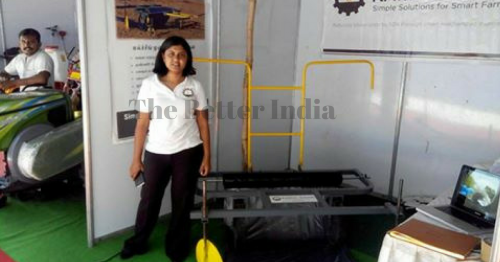
“A small farmer who bought our product was so happy with the reduced labour and cost effectiveness that he personally came to thank me. You get to enjoy such experiences only if you are working for a social impact,” says Devi.
When asked about whether she found her line of work difficult because she was a woman in a typically male-dominated field, she responds positively, saying that her gender never made a difference to the farmers she worked alongside. On the contrary, most people seemed taken with the idea of a foreign-educated girl working for them. Devi soon discovered that it was often times the urban public who came with a discriminatory mind-set with regards to gender-specific work, rather than the vast workforce across rural India.
Today, Kamal Kisan has been able to reach over 800 farmers and deliver a cumulative saving of over Rs. 10 lakh.
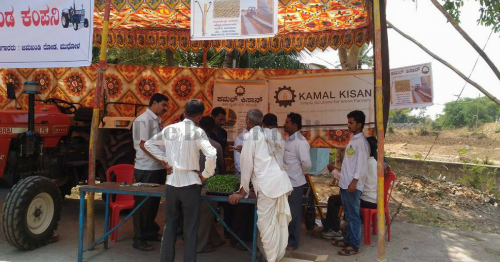
At present, the firm has several innovative products for small farms on the market, as well as plans to develop at least two products in the pipeline per year.
Foremost among these is the Vegetable Planter, a handy low-cost machine that eases the cultivating process of most fruit and vegetable saplings with an increased process efficiency.
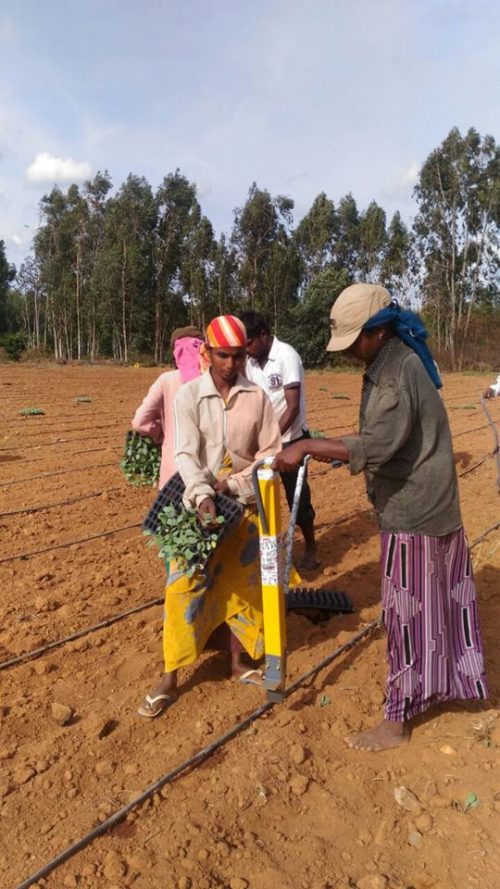
The planter allows for a single laborer to plant a one acre plot with vegetable seedlings within four hours, as opposed to a conventional planter that requires four laborers to achieve the same results. Furthermore, it is portable and easy to operate, manufactured with high-quality steel and equipped to adjust planting depth according to the seeds being worked with.
Another popular creation is the Kamal Kisan Mulch Layer, a tractor-attached device that can lay plastic mulch sheets between three to four feet, covering soil in a single pass.
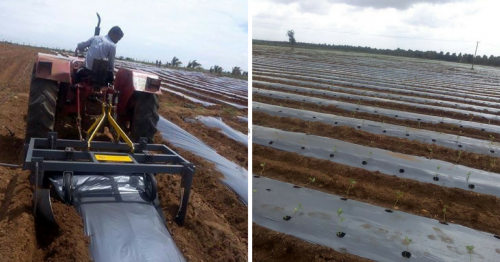
The mulch layer has reduced labour requirements from six to just two laborers, while completing the laying of one acre of mulch film within three hours.
The first-of-its-kind Sugarcane Planter has also received positive reviews.
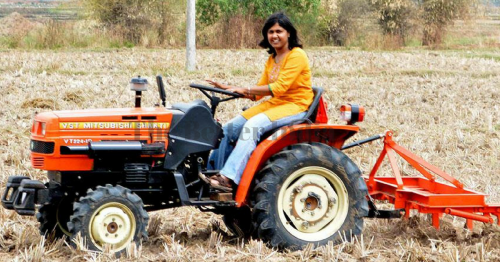
The device combines three processes – ridging, planting and furrowing – to increase efficiency and has reduced the time required to plant a one-acre area to just three hours. Moreover, it mimics current planting methods and easily be can be used with small tractors with powers as low as 30 HP.
Apart from these, the company is researching two new products and is soon to launch a mini rice mill.
“I just have one message,” says Devi in conclusion.“There is huge opportunity in this field and more and more people should come forward to use their skills to help our farmers.”
For more information on the products please log on to www.kamalkisan.com
Like this story? Or have something to share? Write to us: [email protected], or connect with us on Facebook and Twitter.
NEW: Click here to get positive news on Whatsapp!
If you found our stories insightful, informative, or even just enjoyable, we invite you to consider making a voluntary payment to support the work we do at The Better India. Your contribution helps us continue producing quality content that educates, inspires, and drives positive change.
Choose one of the payment options below for your contribution-
By paying for the stories you value, you directly contribute to sustaining our efforts focused on making a difference in the world. Together, let’s ensure that impactful stories continue to be told and shared, enriching lives and communities alike.
Thank you for your support. Here are some frequently asked questions you might find helpful to know why you are contributing?


This story made me
- 97
- 121
- 89
- 167










